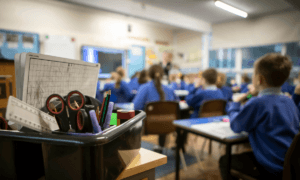1,400 Private Schools Come Together to Take Legal Action Against Fees VAT
Attorneys representing independent schools are alleging that the government is violating the human rights act by imposing VAT on fees.
A coalition representing over 1,400 private schools is preparing to take legal action against the government’s decision to subject independent school fees to VAT.
The Independent Schools Council (ISC), a collective body for seven associations representing private schools in the UK and abroad, has confirmed that its board has voted in favor of challenging the government’s move, with a pre-action letter set to be sent shortly.
This legal action comes in response to Chancellor Rachel Reeves’ announcement in Wednesday’s Budget that VAT will be applied to school fees starting in January.
The government estimates that this policy will generate £460 million in the next year, increasing to £1.7 billion by 2029-2030. These funds are intended for improving standards in state schools by hiring an additional 6,500 teachers and supporting initiatives like breakfast clubs and nurseries.
Opponents argue that the VAT policy could lead to parents who can barely afford private school fees turning to the state sector, potentially creating competition for places, especially in top-rated comprehensive schools.
Special Needs Schools
Concerns have also been raised about children with special needs who may be forced to transition from specialist private schools to state schools that offer less support.
Some headteachers fear that their schools, particularly smaller and more affordable establishments including religious schools, may face closure due to the policy. A group of three Christian schools has initiated a legal challenge under the human rights act, claiming discrimination.
Our primary concern throughout this debate has been the well-being of the children in our schools who may suffer due to this policy,” she added. “We will be championing the rights of families who opt for independent education but may no longer be able to do so because of this unprecedented education tax.”
The government anticipates that private school fees will rise by approximately 10 percent post-VAT implementation, according to a policy document released on Wednesday.
6 Percent Could Leave
The government projects that 35,000 private school students will transition to the state system in the long term after the introduction of VAT in January.
An additional 2,000 pupils, including international students likely to enroll in schools abroad and local students opting for homeschooling, are predicted to exit the UK’s private education sector.
This total of 37,000 departing or not entering the sector equals roughly 6.67 percent of the current private school population, based on government data. The latest figures show the UK’s private school population at 554,253.
On Wednesday, the government also announced an increase in funding for the Continuity of Education Allowance (CEA), which subsidizes boarding school fees for children of mobile military and diplomatic families, ahead of the VAT implementation.
This move followed concerns raised by personnel threatening to leave the armed forces if adequate support ahead of the VAT changes was not provided.
Despite this, ISC remains apprehensive about the impact of the VAT policy on small faith-based schools, specialty arts and music programs, and the many children with special educational needs and disabilities (SEND) in private schools.
Human Rights Act
The legal challenge by ISC will focus on potential breaches of the European Convention on Human Rights and the Human Rights Act 1998.
While separate from other legal actions, ISC intends to collaborate with these third-party groups.
Although Labour had contemplated revoking the charitable status of 70 percent of private schools, this proposal was abandoned due to concerns about its impact on other fee-charging institutions, including universities.
In response to criticism, the government argues that schools can reduce fees so that the overall cost to parents does not significantly increase. However, some smaller fee-paying schools claim this is not feasible.
Human rights barrister Lord David Pannick, KC, will lead the legal proceedings for ISC, assisted by Paul Luckhurst from Blackstone Chambers and the legal firm Kingsley Napley.





